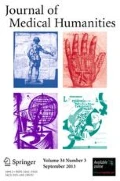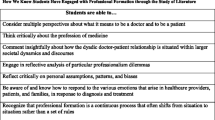Summary
Our purpose has been to illuminate questions surrounding the use of literature in medical education, and to propose criteria for selecting literature which is more likely to evoke readers to reflect on their personal and professional selves. We have suggested that literature promoting vicariousness and vulnerability may validate readers' questions, insecurities, and beliefs insofar as readers are willing to engage with the text cognitively and phenomenologically. This we call reader responsibility. Crucial to nurturing this responsibility are medical educators 2- ducators in any context, for that matter – who are vulnerable themselves, who puzzle outloud, who admit their own incompleteness. Together as learners, teachers and students may come to realize that it is, in the end, the artist who
presses upon our minds the deepest mysteries, so we may feel again their majesty and power ... (which) seizes our lives, and which reveals us startlingly to ourselves as creatures set down here bewildered. (Dillard 1989 72–73)
Similar content being viewed by others
References
Banks, Joanne. “The Wonders of Literature in Medical Education.”Mobius 3 (1982): 24.
Barone, Tom. “Curriculum Platforms and Literature.”Curriculum: Problems, Politics, and Possibilities. Ed. L. Beyer & M. Apple. Albany: SUNY Press, 1988. Faust, 1985, pp. 3–4.
Booth, Wayne.The Company We Keep: An Ethics of Fiction. Berkeley: University of California Press, 1988.
Coles, Robert.The Call of Stories: Teaching and the Moral Imagination. Baltimore: The Johns Hopkins Press, 1978.
Charon, Rita. “To Render the Lives of Patients.”Literature and Medicine 5 (1986): 59.
Dillard, Annie.An American Childhood. NY: Harper & Row, 1987.
Dillard, Annie.The Writing Life. NY: Harper & Row, 1989.
Greene, Maxine. “Sense-making Through Story: An Autobiographical Inquiry.”Teaching Education 2 (1987): 12.
Iser, Wolfgang.The Act of Reading: A Theory of Aesthetic Response. Baltimore: The Johns Hopkins Press, 1978.
Novak, Michael. “The Liberation of Imagination.” In Proceedings, Second Session, Institute on Human Values in Medicine. Philadelphia: Society for Health and Human Values, 1972.
Percy, Walker.Diagnosing the Modern Malaise. New Orleans: Faust, 1985.
Perry, William.Forms of Intellectual and Ethical Development in the College Years. NY: Holt, Rinehart, & Winston, 1968.
Selzer, Richard. “Brute.”Letters to a Young Doctor. NY: Simon & Schuster, 1983.
Author information
Authors and Affiliations
Rights and permissions
About this article
Cite this article
Wear, D., Nixon, L.L. The fictional world: What literature says to health professionals. J Med Hum 12, 55–64 (1991). https://doi.org/10.1007/BF01142869
Issue Date:
DOI: https://doi.org/10.1007/BF01142869




